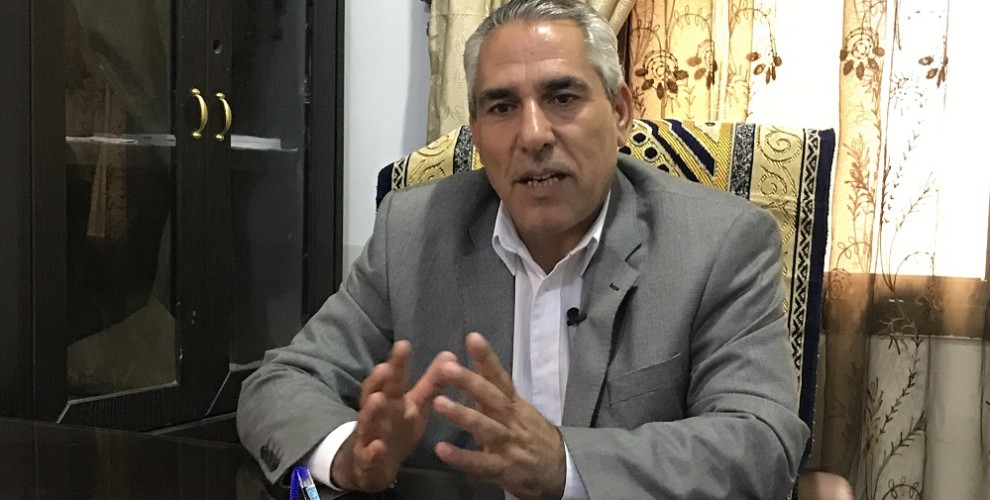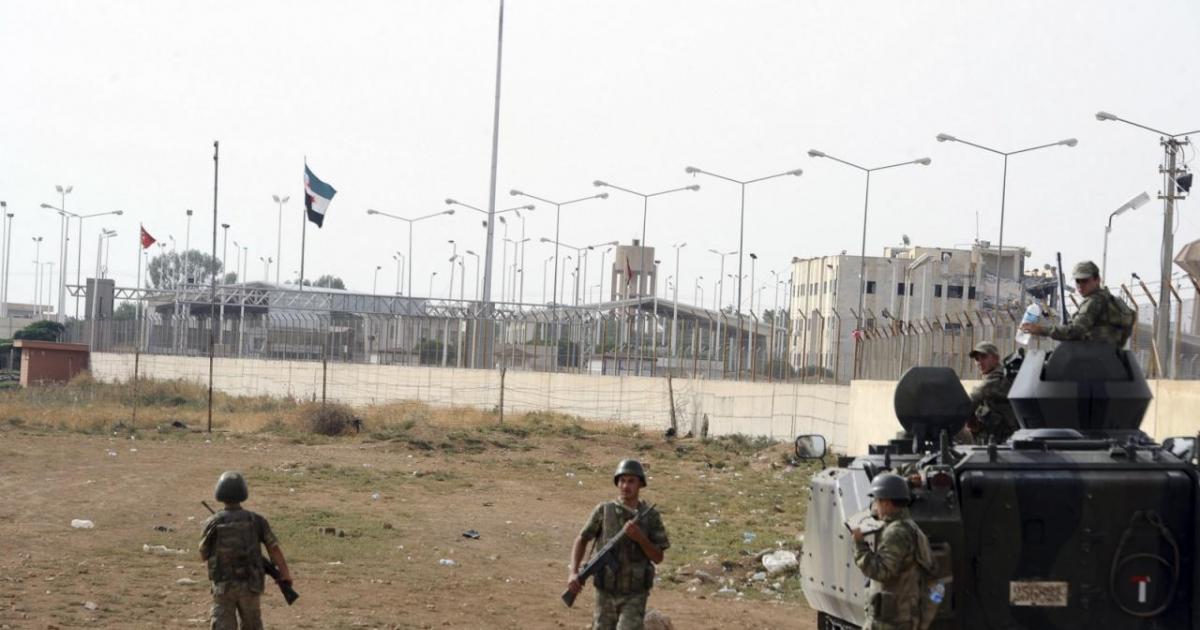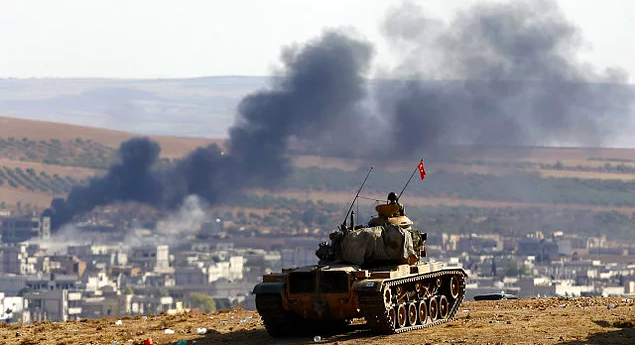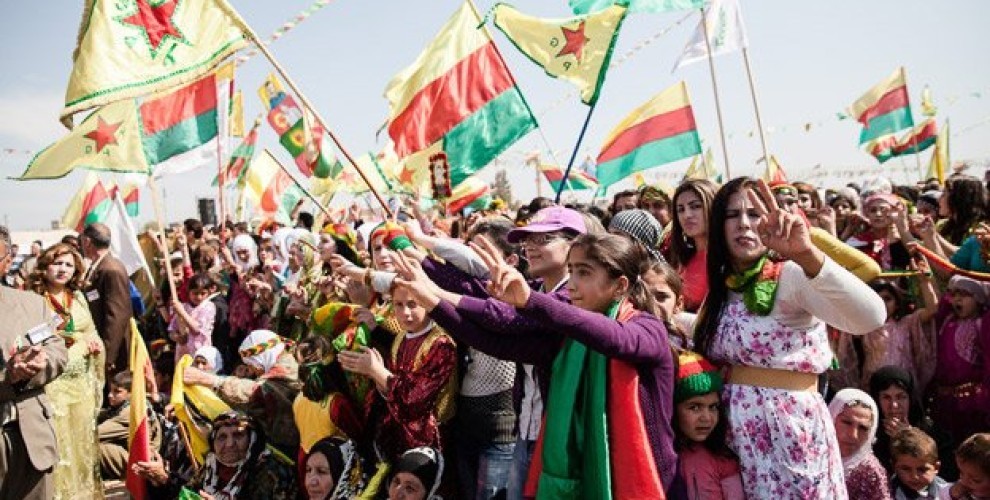“Come and see for yourself how we govern ourselves in Girê Spî”
Co-Chair of the Executive Council of the Girê Spî Canton invited all journalists to come and see for themselves the developments in Girê Spî.
Co-Chair of the Executive Council of the Girê Spî Canton invited all journalists to come and see for themselves the developments in Girê Spî.
Hemid al-Abid is an Arab citizen who was forced to flee Girê Spî around a year after the DAESH (ISIS) mercenaries occupied the area.
In June 2015, the YPG and YPJ liberated the city and al-Abid could return. Al-Abid has participated in the rebuilding of both the city and life after the liberation of Girê Spî and he is now the Co-Chair of the Executive Council of the Girê Spî Canton.

Speaking to ANF, al-Abid said that Erdoğan was afraid of the democratic environment established in Girê Spî because he did not want democracy in the region. “At present - he said - in the areas occupied by the Turkish state, such as Afrin, al-Bab, Jarablus and Azaz, there is rape and plunder. But in the regions we govern there is no such thing. Here people experience democracy, which is what the Turkish president is afraid of and which is why he is trying to occupy our regions once again”.
Al-Abid pointed out that Girê Spî has not lived in peace like today for a long time and has not been governed by such a people-based system throughout history.

“Everyone knows - al-Abid said - that the Ba’th regime was a sovereign regime. Theft and bribery were common within all state institutions. There was inequality. The intelligence and security forces had established a total control over the society”.
At the same time, al-Abid added, “there were both poverty and lack of education in areas such as Raqqa, Deir ez-Zor, Hesekê, Girê Spî. In other words, there was no concern and investment in our region”.
Al-Abid said that because of this antidemocratic and unequal behaviour by the regime, and because of the pressure on society by the intelligence, the community revolted. “Quickly - he said - the Free Syrian Army (FSA) groups moved in to fill the vacuum left by the regime. Turkey was also actively engaged in this process”.

As a result, said al-Abid, “the people rebelled against the regime. People hated all state institutions because of their oppression, inequality and antidemocratic approaches. Turkey saw and seized this opportunity and heavily intervened in this process. Turkey provided weapons that were given to the people”.
As a result of this intervention by Turkey, 105 FSA units were set up in Girê Spî. “Turkey had opened the door to them. Each of these groups was controlling the border crossing for two hours. They were forcing people to pay ‘taxes’. Factories’ machines in Girê Spî and Syria, agricultural products, were taken to Turkey”.

Within a short period of time, said al-Abid, “Islamic groups penetrated the armed groups. Especially Ahrar al-Sham and Ketaib Faruk led them. Al-Nusra Front was also on the field”.
Then the name of DAESH entered the scene. “All of these other groups melted away - said al-Abid - most of them joined DAESH, and in the end basically only DAESH remained. Throughout DAESH times Turkey's border gate was open. Previously, there were clashes among the FSA groups. But there was no conflict between these groups at the time of DAESH because they were all inside DAESH”.
Al-Abid said that by 2013, after an order issued by Turkey, DAESH, al-Nusra Front, and mercenaries such as Ahrar al-Sham and a total of 21 mercenary groups began the process of attacks against Kurds in Shehba, Manbij, Raqqa and Girê Spî.

“Then, DAESH wanted the war to be between Arabs and Kurds. Some were deceived by this game. But the people of the region didn’t fall into this game. For example, when both Ahrar al-Sham and DAESH removed Kurds from Girê Spî, Kurds entrusted their goods to the Arabs”.
Then the mercenaries attacked Kobanê. “The main purpose of their attack on Kobanê - insisted al-Abid - was to create a war between Arabs and Kurds. But in Kobanê they failed. What we are witnessing now is nothing but a continuation of the Turkish state threat, this time in the shape of attacks against Girê Spî. They want to cause a fit between Arabs and Kurds”.
Al-Abid underlined once again how during both the time of FSA and DAESH Turkey kept playing an important role, actually giving orders to the mercenaries, using the availability of weapons, and keeping its borders open all the time for the crossing of the mercenaries.

Al-Abid has no doubts that the attacks carried out in the past few weeks by Turkey are aimed at saving DAESH or what is left of it.
“The end of DAESH - said al-Abid - will mean that Erdoğan's finger will no longer remain in this region. That's why he's threatening the area. Because he won't be able to get any interests from this area anymore. Turkey is very afraid of the democratic organizations and the democratic forces we have established here. Because they do not want democracy in the region”.

Ending his remarks, al-Abid invited all journalists to come and see for themselves the developments in Girê Spî.
“Walk around Girê Spî, - he said - see for yourself how many roads, schools and services we have done. Here we are implementing a new model of governance. We are governing ourselves without any sultans, sovereignty and oppression. I hope that this form of governance will be taken as a model in the Middle East and all Arab states, and that the peoples of the region will be able to self-govern themselves”.